WINDHAM — When the black-and-white puppy arrived at the Maine Correctional Center in May, he liked his own space.
Everest would climb into Tim Riley’s bottom bunk and snuggle for a minute or two. Then the puppy would scoot away to the end of the bed – as if to say, enough for now. But on a sunny Tuesday in June, six weeks after he arrived at the Windham correctional facility, Everest did not move from Riley’s side.
“Now he likes to fall asleep in your arms,” Riley said.

Tim Riley holds Everest before saying goodbye at the Maine Correctional Facility on June 25. Riley trained and lived with Everest for six weeks in the Paws in Stripes program. Derek Davis/Staff Photographer
Riley, 36, is stocky and tattooed, serving a decade for robbery. And like the puppy that lived in his prison room for six weeks, Riley is not the same as he was before the pair met.
“I know I’m helping the dog, but the dog doesn’t know how much he’s helping me,” Riley said.
Riley works in the Paws in Stripes program, a partnership between the Windham facility and the Animal Welfare Society in Kennebunk. Rescue puppies live with inmate handlers at the prison and participate in obedience classes for a month and a half. Animal training programs exist in correctional facilities across the country, and proponents say the benefits go beyond a dog learning how to sit and stay.
While there is little research about the effect of animal programs on behavior in prison or recidivism rates, anecdotal reports from Maine and other states are overwhelmingly positive. The Animal Welfare Society recently launched a similar program at Long Creek Youth Development Center in South Portland because the state was pleased with the results in the Windham adult facility.
LOTS OF APPLICATIONS
Penny Bailey, a unit manager at the Maine Correctional Center, always has a stack of applications from inmates for the puppy program.
She helped start the animal training programs at the prison, and the current partnership with the Animal Welfare Society began in 2012. The Maine Correctional Center hosts four to six groups of puppies each year. The shelter covers most costs, such as food and supplies – about $1,000 per group. The Maine Department of Corrections pays the inmates a monthly stipend of $30 when they are working as puppy handlers.
Only inmates at a certain privilege level can apply for the program, and the participants go through a strict screening process that eliminates anyone with a history of violence or cruelty to animals. Each puppy has a primary handler and multiple assistants. Any disciplinary incident means the inmate is removed from the program.
“At first, we had some staff that didn’t feel it was appropriate to have puppies in this setting, and what we found is that it brings the tension down in the unit,” Bailey said. “How can you stay mad when a puppy comes over and licks your face?”
Kim VanSickle, a certified professional dog trainer at the Animal Welfare Society, has been leading the class at the prison for years. She said the puppies from the Maine Correctional Center tend to be better behaved than other young dogs their age. The program helps socialize the puppies and prepare them for adoption, she said.
“People get busy, and they’re not able to practice,” VanSickle said. “But you go to the prison, and that’s what these guys have been doing all week long, practicing with the puppies and playing. It’s a joy, really, to go in and do that.”
In May, Everest and five other puppies arrived at the prison. Most of the group were from the same litter. Their mixed breed was unclear, but each is expected to grow to more than 45 pounds. A staff person named Everest for a character on the children’s TV show “Paw Patrol.”
Riley has been an assistant in the past, but he was a primary handler for the first time with Everest. He had only been at the Maine Correctional Center since January, but he has been incarcerated for nearly half his life.
Riley grew up in southern Maine, and he said he rebelled at a young age when his father died. He was 22 when he was arrested for an armed robbery in 2005, and he was ultimately sentenced to nearly 10 years in federal prison for that crime.
“I didn’t really do no programming,” Riley said of the federal prison. “I fought the system to see what I could get away with.”

Tim Riley takes Everest out for the last time after the dog spent six weeks at the Maine Correctional Center in the Paws in Stripes program. Derek Davis/Staff Photographer
He was released in 2014, and he was home for less than three months before he was arrested for another robbery. He was ultimately convicted and sentenced to 20 years in prison, with all but 10 years suspended and four years of probation. He began that sentence at the Maine State Prison in Warren.
For years, Riley said he embraced a prison culture of underground tattooing and drug trafficking, but his mindset changed when his mother was diagnosed with cancer in 2017. She still lives in southern Maine, and corrections officials agreed to transfer him to Windham earlier this year to be closer to her. She asked him to quit his criminal behavior, and he promised he would.
He said he stopped using drugs and started studying nonviolent communication. He does landscaping work around the prison, and he planted a string of yellow and orange marigolds in the yard near his housing unit. And he found the puppy program.
“Prison life, it can be avoided here,” Riley said.
OBEDIENCE CLASS
The trainers from the Animal Welfare Society arranged obstacles in the prison gym on a Thursday in June. The door opened, and a group of inmates walked through a metal detector. Six puppies on leashes trotted through with them, unfazed by the security. The puppies have been here for five weeks, and this was their third and final obedience class.
Riley took turns on the obstacles with the assistant trainer, Michael Gagne. The two men shared a sparse room with a third inmate in a nearby housing unit. Everest’s crate sat between two sets of metal bunks, and his bowls for water and food waited next to the door.

Michael Gagne gets Everest to stand on an inclined platform during a Paws in Stripes training session at the Maine Correctional Center. Derek Davis/Staff Photographer
Gagne, 42, grew up in York County. He was sentenced last year to at least seven years for a string of burglaries, and he has a history of similar crimes dating back to his teenage years, which he said is tied to abuse and addiction. But he said he began to change in 2007, when he was serving a previous sentence at the Windham prison and participated in an earlier version of the puppy training program.
He recently wrote about that experience in a creative writing class. In that essay, he said he worked with Blues, a dog that had been abused at a puppy mill.
“He was so broken and afraid of people that I reacted emotionally to his anguish,” Gagne wrote. “I showered Blues with all the love and affection I had ever wanted and had always been denied. I watched a slow trust build with him and in spite of it all I felt a slow transformation within myself.”
Recovery has not been easy for Gagne, and he has new convictions since then. But he compared working with the puppies to therapy, and he said it prompted him to seek out other programs.
“We’re in this place because we harmed people, but we’re hurting, too,” Gagne said. “These little fragile lives give me courage.”
During the class, the two men rewarded Everest with treats and compared notes on his progress.
“He responds better on your right side,” Riley said as he handed the leash to Gagne.
“My right side,” Gagne confirmed.
“Yeah, on the leash,” Riley said.
For one of the final tasks, they teamed up to coax Everest through a red-and-yellow tunnel, one man on either end. When the puppy emerged, Riley picked him up and rubbed the black spots on his belly. The shelter staff set up a graduation ceremony, where each dog got a certificate and a plush toy. Everest got a neon green dinosaur, and Riley grinned as he watched the puppy play.
“You don’t have to put on a tough-guy role,” Riley said. “I talk to them like they’re little babies.”
‘A JOYOUS OCCASION’
The following week, the puppies would leave the prison. Everest would go to a new family almost immediately, but the shelter does not identify adopters as part of its confidentiality policy.
That new owner would get a journal from Riley with details like his particular commands (Riley waved at him to get him to come) and his tricks (the hardest one was rolling over, Riley said). On their last morning together, Riley flipped through the 22 pages of handwritten notes.
“Hopefully whoever gets him has kids,” Riley said. “He’d be good with kids.”
He paused, and then added: “I wish I was in here kinda short, because I would have tried to get him.”
Gagne has more experience with the program – and the goodbye.
“It becomes a joyous occasion for them to go, because I get to do it again,” he said. “The love that puppy shares with a new family is the love that we gave them.”
The next group of puppies usually arrives within a couple of days or weeks. Riley looked at a neon green blanket patterned with Santa Clauses, wrapped around Everest but soon to be washed for another dog.
“When they leave, this place will be polluted with down people,” Riley said. “Not like fighting, but —”
“Melancholy,” Gagne offered.
“And when they come again, it’s like Christmas,” Riley added.
Soon, Riley and Gagne would walk the puppies across the yard. Men would stop their conversations to pet the dogs one more time or just watch them go. Gagne would sweet-talk Everest until the last minute – “Enjoy your forever family,” he would say – but Riley would not look back when he finally hands the leash to the shelter staff. He would say later that he did not want to become emotional.
But before that last walk, Riley rested on his side on his bunk, facing the wall. Everest curled in his chest, wrapped in the Santa Claus blanket. The plush green dinosaur was near the pillow. Gagne sat in a nearby chair, watching the scene but not speaking. A prison staffer who would help load the puppies into the shelter van knocked on the open door but waited to enter.
Riley did not immediately react to the sound. Before he sat up, he lingered on the bunk with the black-and-white puppy, his for just one more moment.
Send questions/comments to the editors.


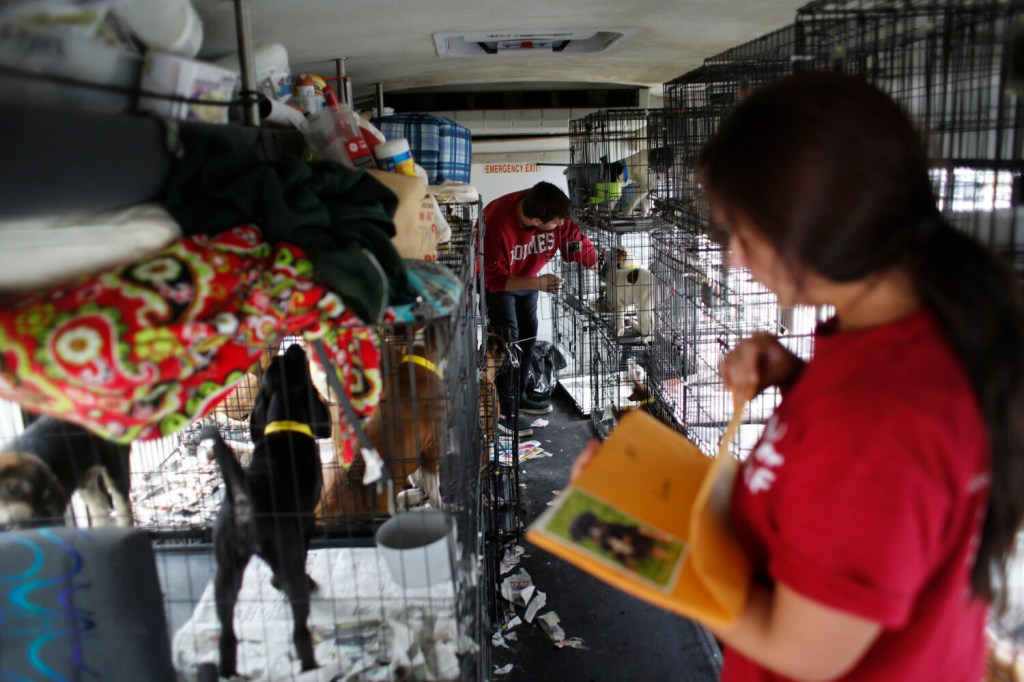


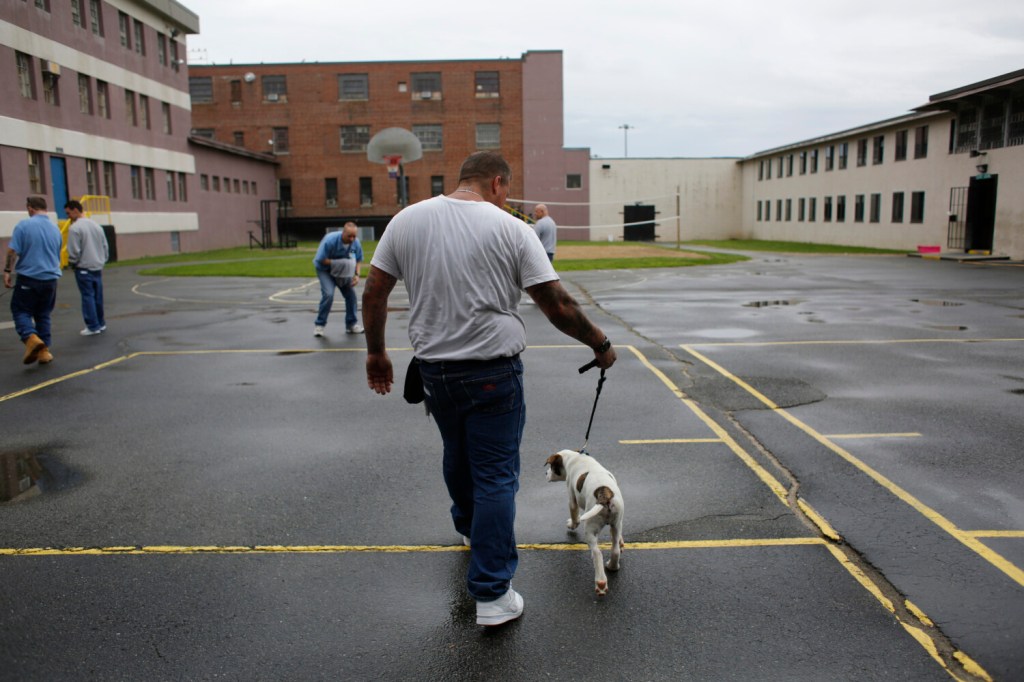
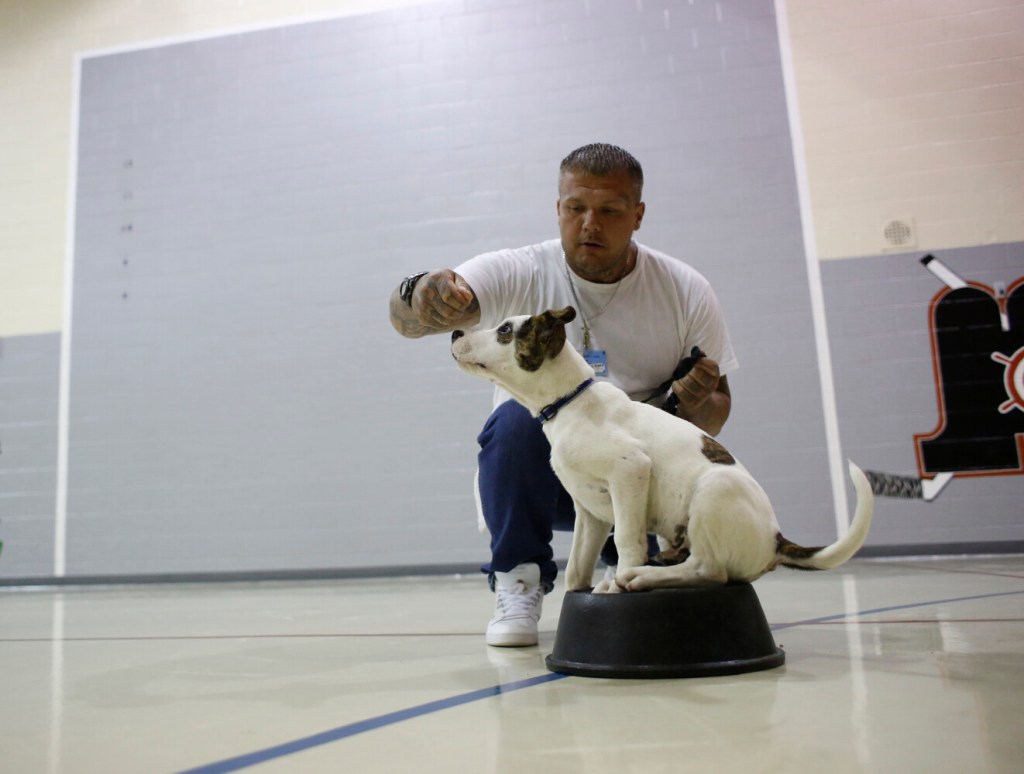
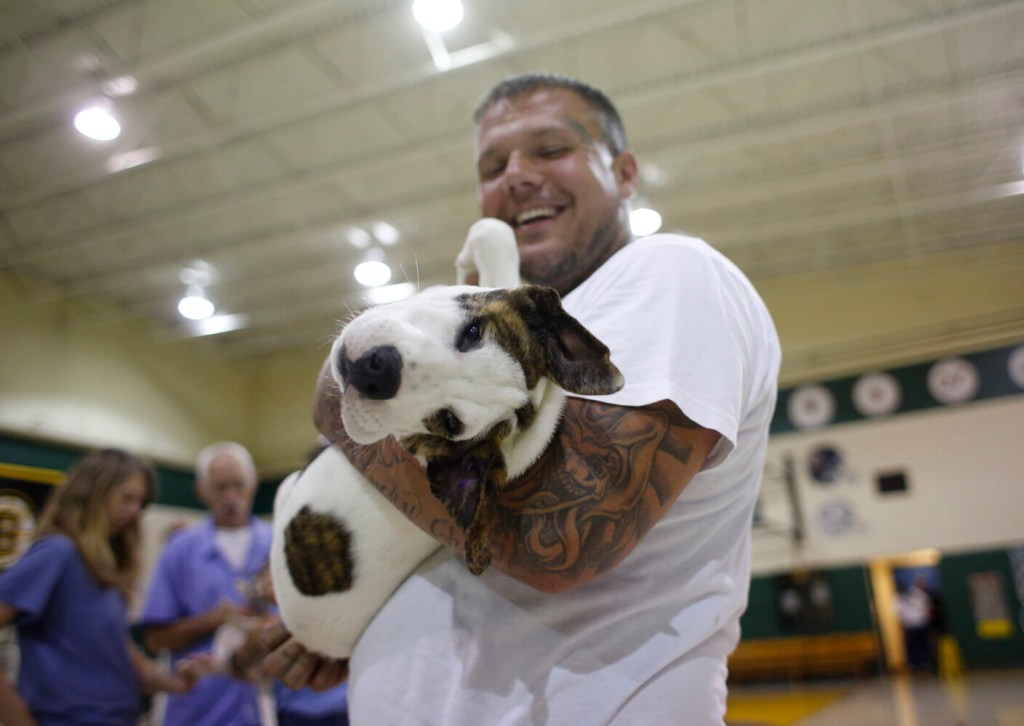
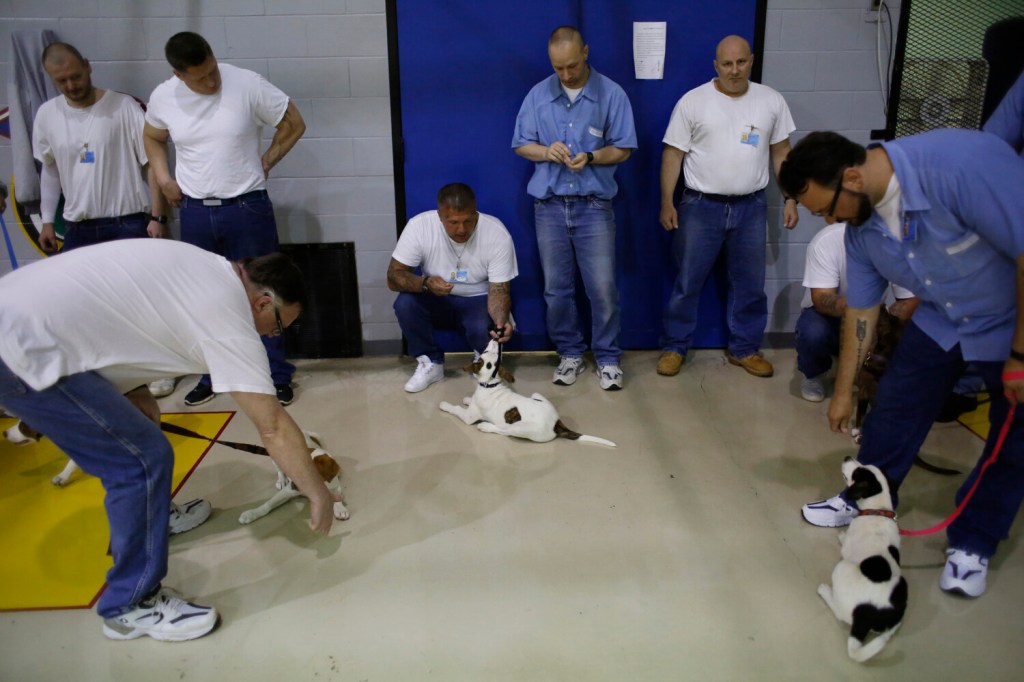
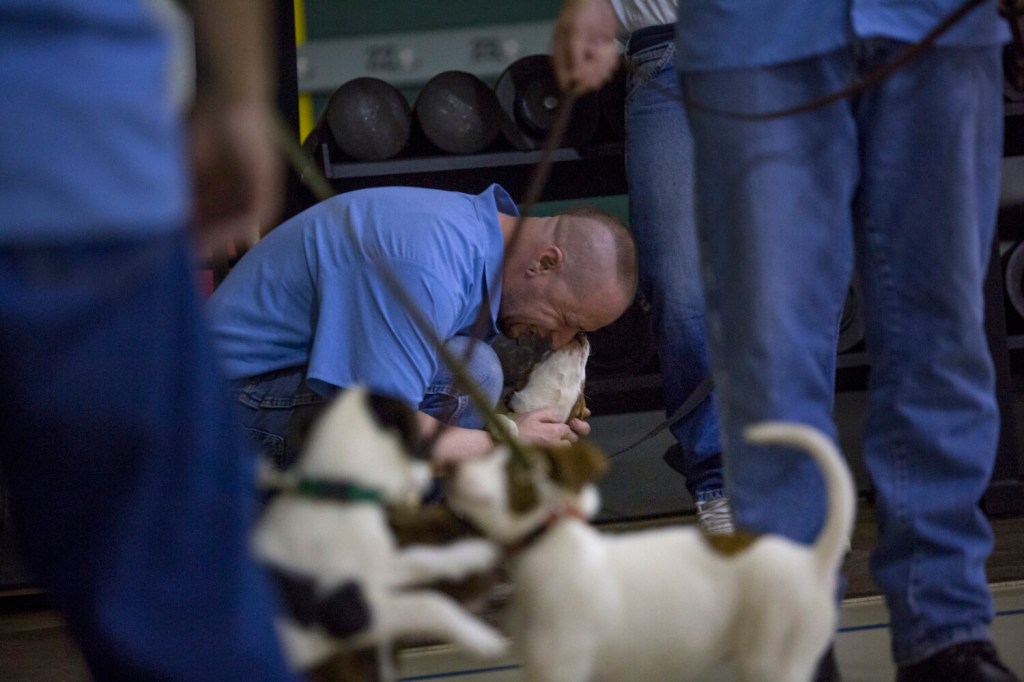
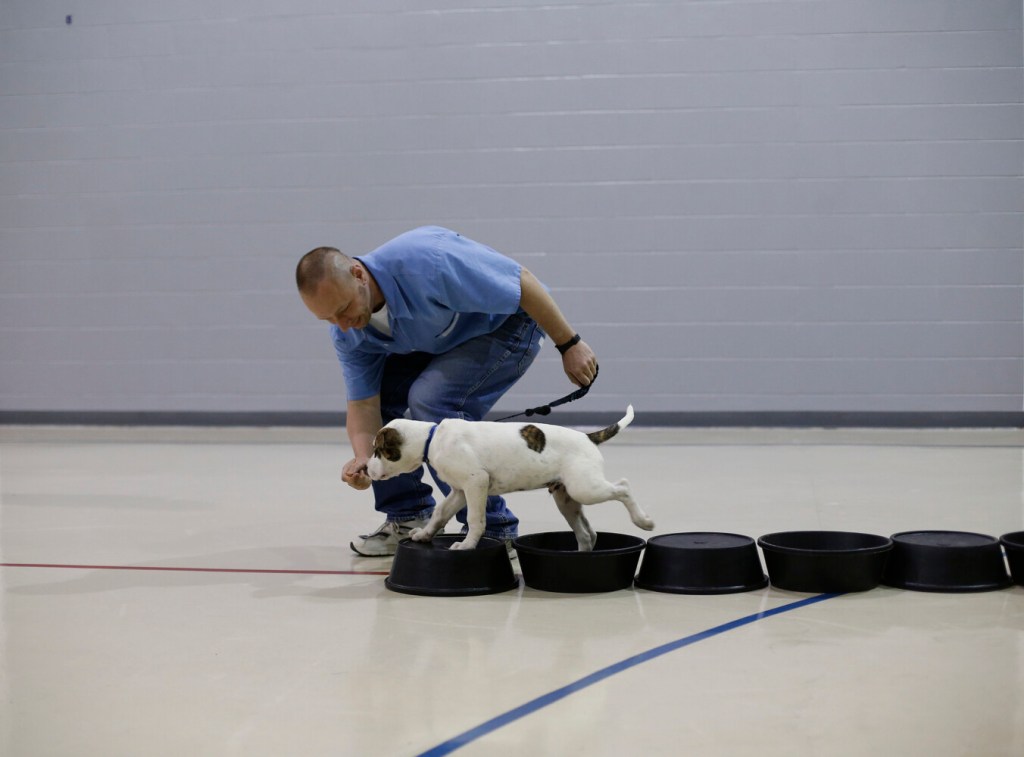
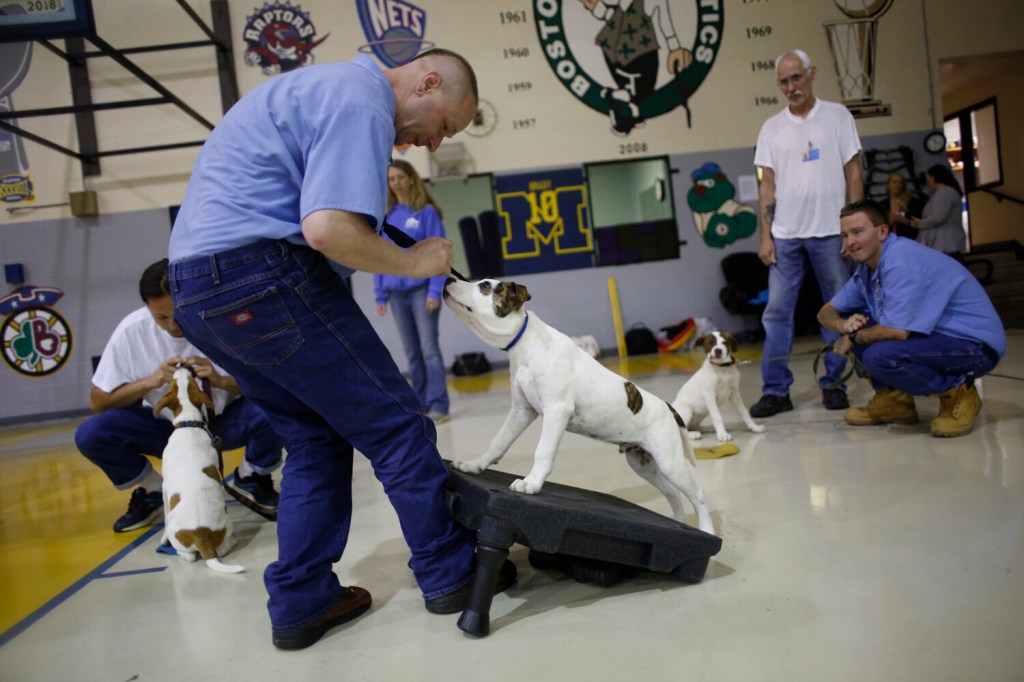
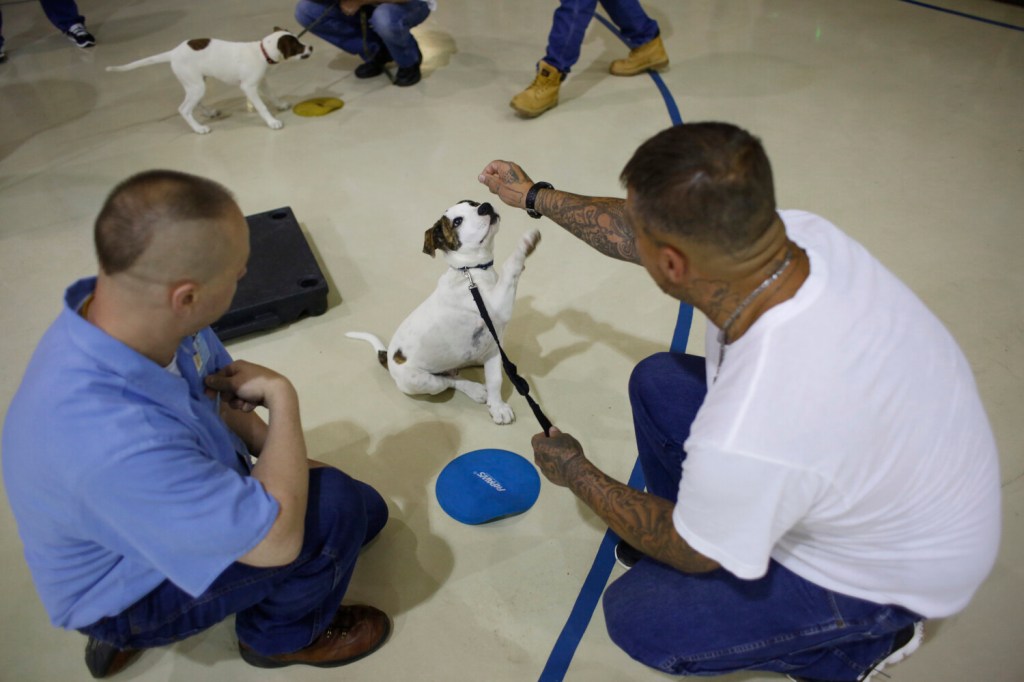
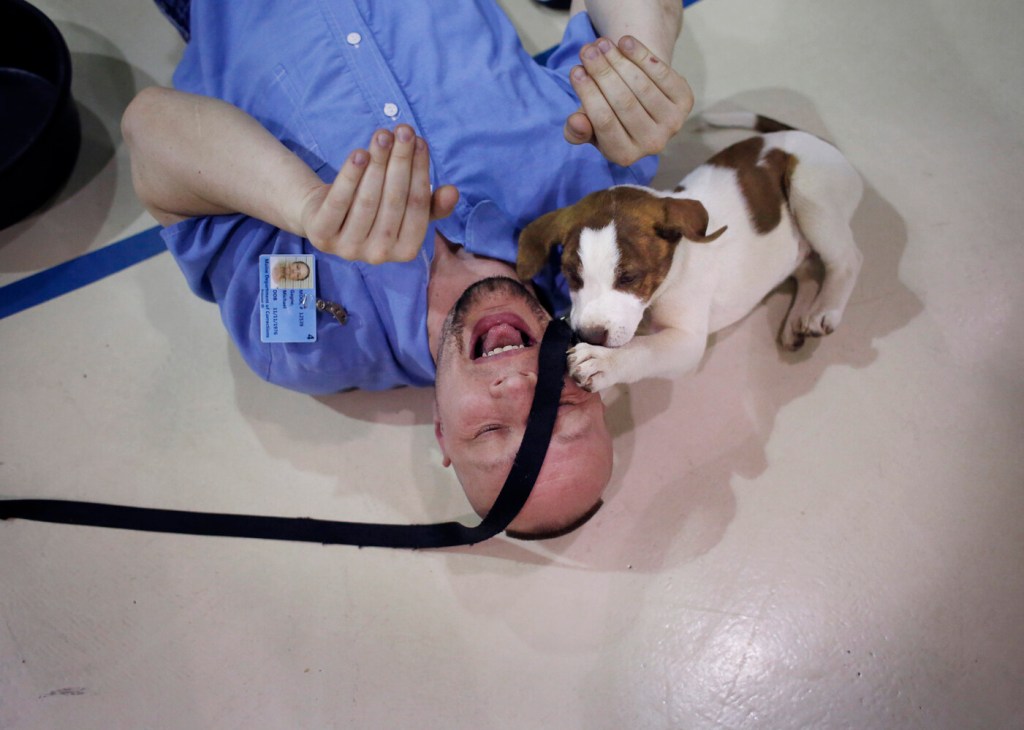
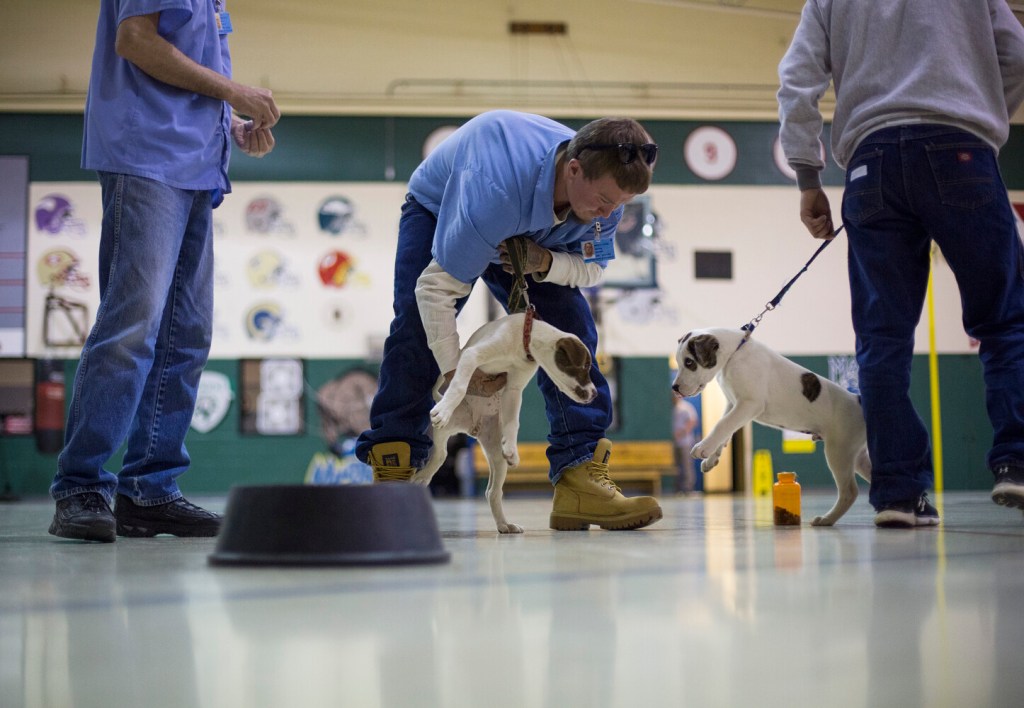
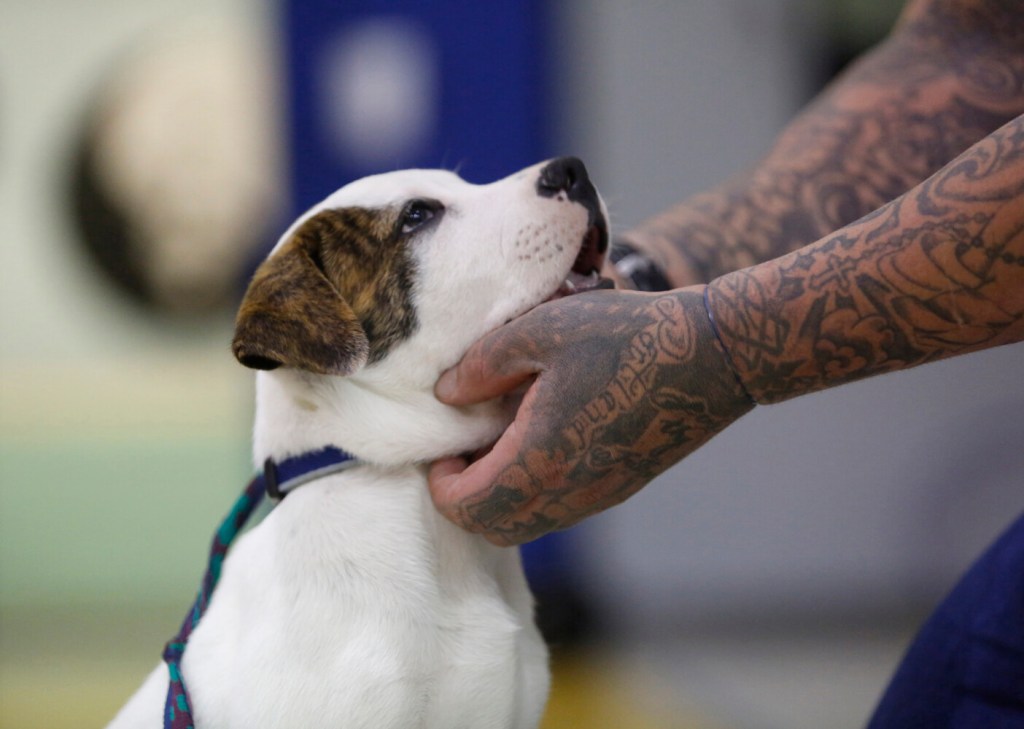
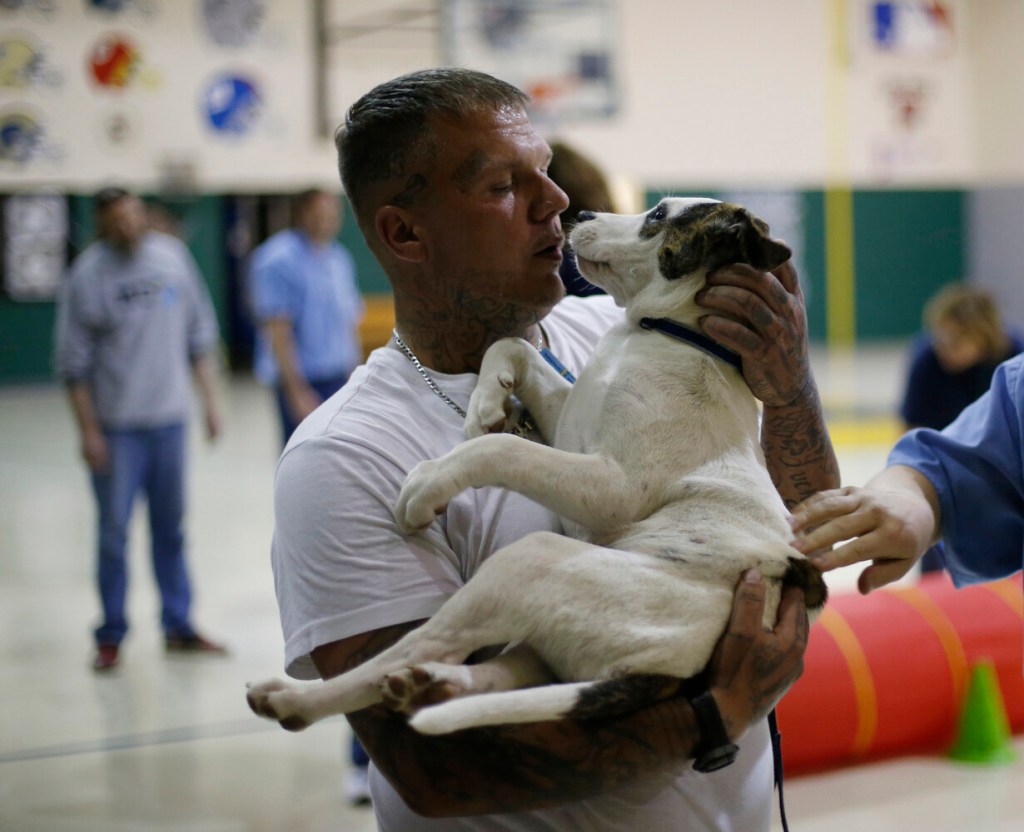
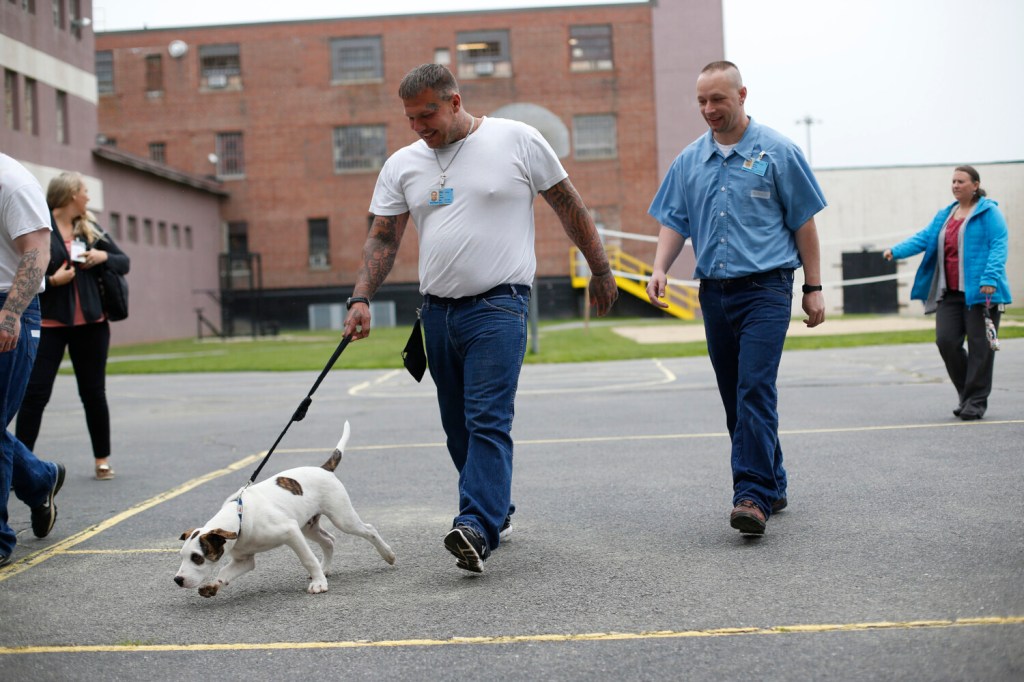
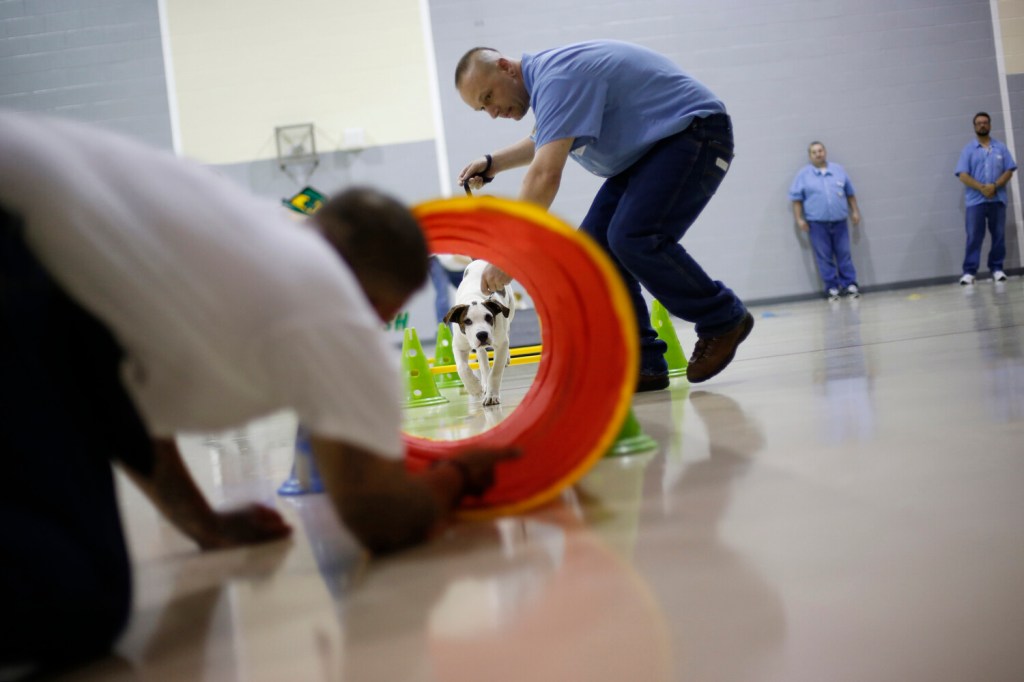

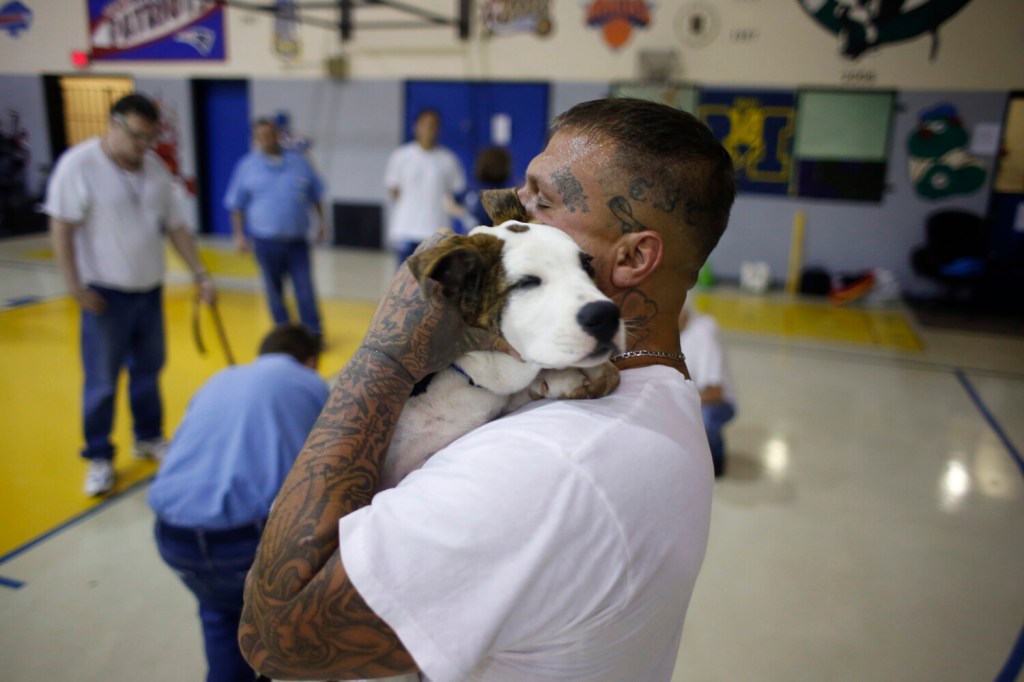
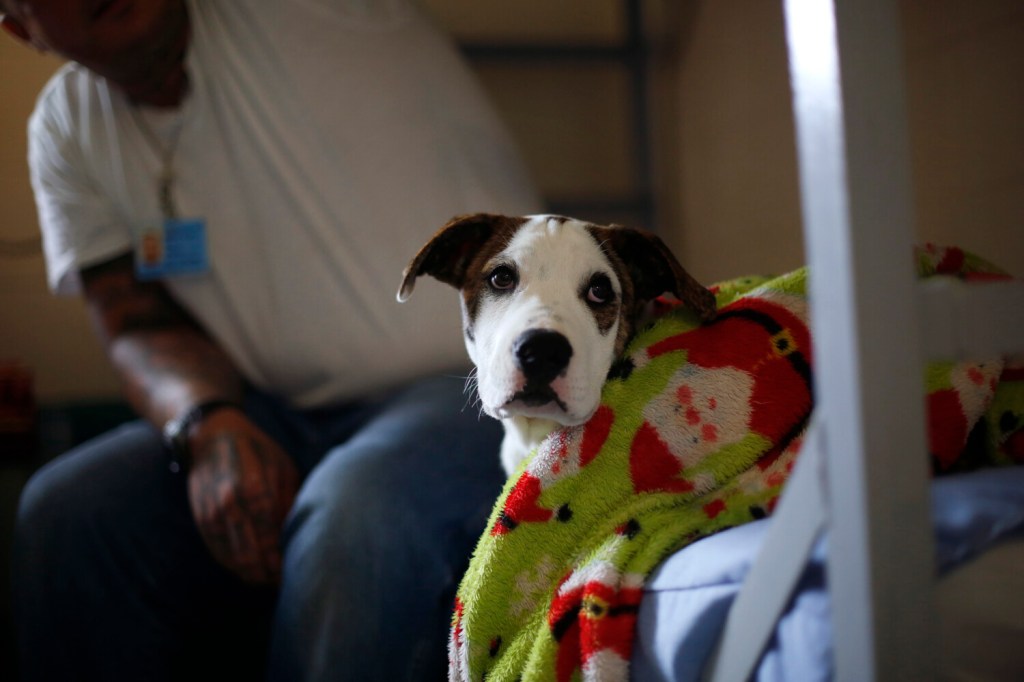
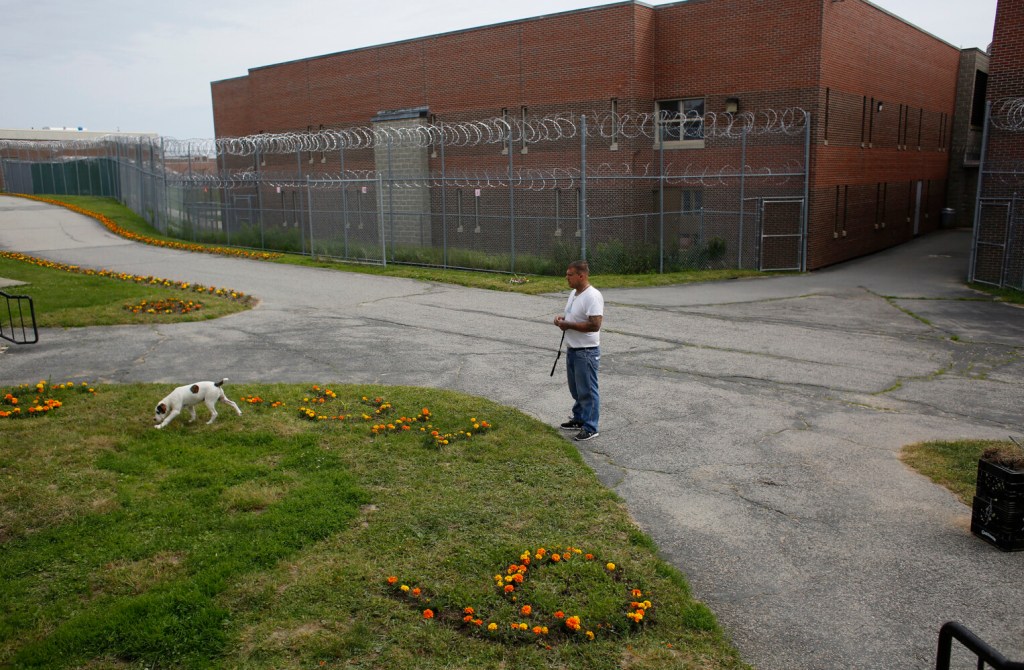


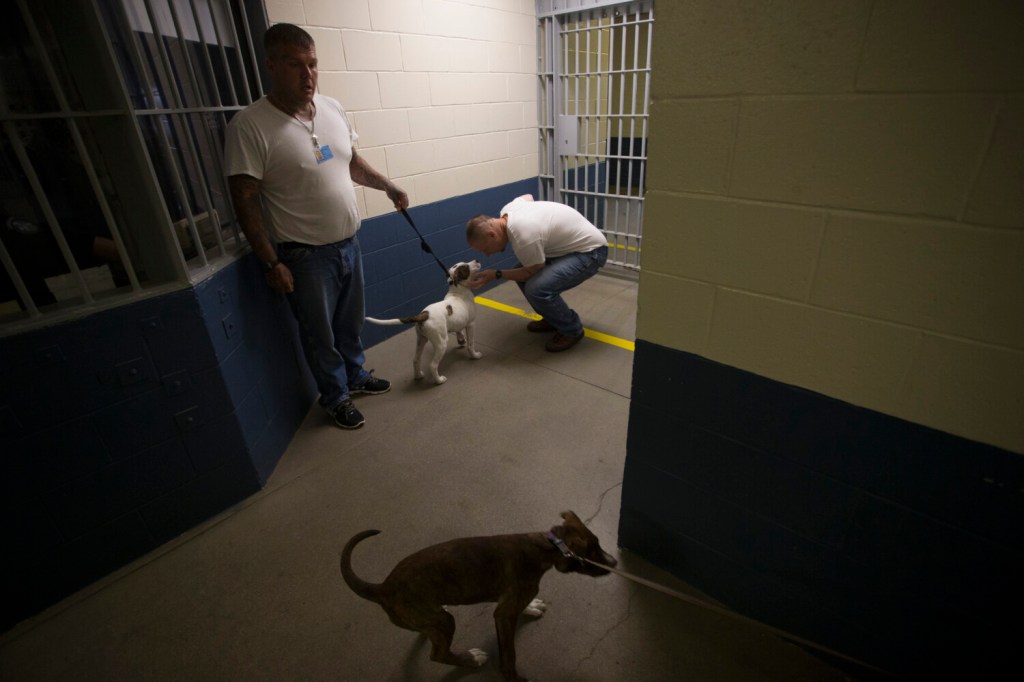

Comments are no longer available on this story